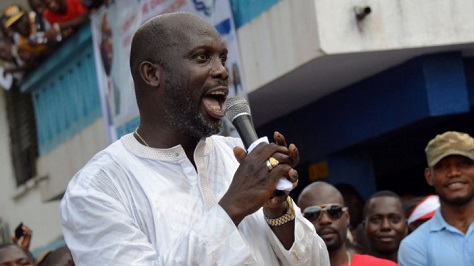George Weah, the soccer superstar-turned-politician, is back.![]()
Weah, who narrowly lost a runoff in Liberia’s 2005 presidential election to Ellen Johnson Sirleaf, returned to the heart of Liberian politics by winning a seat in Liberia’s 30-member Senate. Half of the Senate’s seats were up for election in the December 20 elections.
In results announced earlier this week, Weah overwhelmingly defeated Robert Sirleaf, the president’s son, by a staggering margin of 78% to 11% in Montserrado County, the most populous of Liberia’s counties and home to the Liberian capital of Monrovia.
In all, Johnson Sirleaf’s Unity Party won just four of the 15 seats in the elections, which also saw the reelection of Prince Johnson, a former rebel leader who launched attacks against former president Samuel Doe in 1990 and Jewel Howard Taylor, the ex-wife of Charles Taylor, who has been convicted of war crimes and crimes against humanity by the International Criminal Court.
* * * * *
RELATED: West Africa’s Ebola epidemic is as much a crisis of governance as health
RELATED: As Sirleaf pushes for more power, could Ebola victimize Liberian democracy?
* * * * *
There are three clear narratives about the Senate elections worth heeding.
1. Give Liberia credit for having the moxie
to hold elections in the midst of the Ebola crisis
Despite all that the country has suffered in the past year during west Africa’s terrifying Ebola epidemic, it’s something of a miracle that the elections were such a success, even if they were initially delayed and still marked by low turnout. The logistics alone of holding elections in a country still battling new daily Ebola cases is something of a nightmare. Liberia’s supreme court, at Johnson Sirleaf’s urging, delayed the elections, initially scheduled for October 14, by two months and, with large gatherings still prohibited throughout the country, it was virtually impossible to hold large political rallies.
2. The Sirleaf administration is unpopular,
and it’s not handled the Ebola crisis perfectly
It’s clear that there’s significant disillusion with Johnson Sirleaf’s administration and its conduct over the course of the nine-month battle against Ebola. For all of Johnson Sirleaf’s international popularity, she has become increasingly unpopular at home. Her government initially failed to stop the epidemic’s spread earlier this year; she was then forced to adopt several strict measures, including closing the country’s schools, imposing a nighttime curfew, closing the country’s borders, and ordering all dead bodies cremated — the latter considered a cultural taboo in Liberian society, so much so that the government halted the cremation policy earlier this week following the elections. Johnson Sirleaf has also walked a fine line between necessary protective measures and overstepping constitutional boundaries. For example, the Liberian parliament rejected her attempts to reduce press freedom, if only temporarily, and Sirleaf tried to push through constitutional changes to strengthen executive powers in October.
3. George Weah is now the frontrunner to succeed
Johnson Sirleaf, but what is his plan for Liberia?
Weah, the leader of the opposition Congress for Democratic Change, has now established himself as a strong frontrunner for the 2017 presidential election. Johnson Sirleaf, who defeated Weah, first very narrowly when he was a presidential candidate in 2005, and again in 2011 when Weah served as a vice-presidential candidate, is term-limited and so will serve as president for just two more years.
But Weah has barely sketched out a platform for what he wants to accomplish as a senator. One report claimed that Weah would detail his policy preferences in a post-election speech in Monrovia. Politicians in the United States and Europe are also often vague about their policy stands as well, but Weah might at least describe how he would have handled the Ebola epidemic differently than Johnson Sirleaf. For example, does he believe that he could have rebuilt Liberian institutions more rapidly than Johnson Sirleaf (who once, briefly, supported Charles Taylor’s rise to power)? Would Weah have invested materially more in a health system that might have withstood the Ebola threat more vigorously?
Moreover, even as the Ebola epidemic wanes, Liberia now faces many difficult challenges ahead. With its health care system stretched to its limits (and after many of its leading doctors and other health professionals succumbed), Liberian agriculture, commerce and education have suffered in the last nine months. Rebuilding Liberia’s economy and institutions after the Ebola crisis will be no less crucial than the post-war reconstruction.
In the months ahead, as the Ebola threat hopefully recedes, Weah should work with Johnson Sirleaf as appropriate to facilitate Liberia’s regrowth — an area where US military personnel might also play a helpful role when the immediate Ebola challenge subsides.
